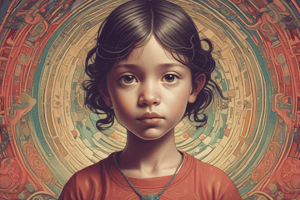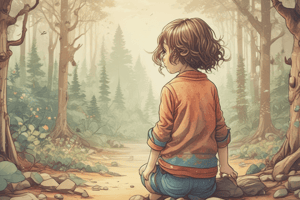Podcast
Questions and Answers
According to Erikson's theory, what is the psychosocial crisis faced by a child between 1 to 3 years of age?
According to Erikson's theory, what is the psychosocial crisis faced by a child between 1 to 3 years of age?
- Trust vs. Mistrust
- Industry vs. Inferiority
- Initiative vs. Guilt
- Autonomy vs. Shame (correct)
What is the outcome of successfully navigating the 'Trust vs. Mistrust' psychosocial crisis?
What is the outcome of successfully navigating the 'Trust vs. Mistrust' psychosocial crisis?
- Shame and Doubt
- Sense of Hope (correct)
- Sense of Inferiority
- Fear of Intimacy
In Erikson's theory, what is the psychosocial crisis that an adolescent faces?
In Erikson's theory, what is the psychosocial crisis that an adolescent faces?
- Identity vs. Role Confusion (correct)
- Industry vs. Inferiority
- Initiative vs. Guilt
- Autonomy vs. Shame
What is the positive outcome of the 'Autonomy vs. Shame' psychosocial crisis?
What is the positive outcome of the 'Autonomy vs. Shame' psychosocial crisis?
According to Erikson's theory, what is the psychosocial crisis faced by a child between 3 to 5 or 6 years of age?
According to Erikson's theory, what is the psychosocial crisis faced by a child between 3 to 5 or 6 years of age?
What is the negative outcome of the 'Initiative vs. Guilt' psychosocial crisis?
What is the negative outcome of the 'Initiative vs. Guilt' psychosocial crisis?
What is the first psychosocial crisis according to Erikson's theory?
What is the first psychosocial crisis according to Erikson's theory?
What is the outcome of a successfully resolved psychosocial crisis?
What is the outcome of a successfully resolved psychosocial crisis?
What is the main focus of Erikson's personality theory?
What is the main focus of Erikson's personality theory?
What is the positive outcome of the Autonomy vs Shame and Doubt crisis?
What is the positive outcome of the Autonomy vs Shame and Doubt crisis?
Why is Erikson's theory more appealing to helping professionals than Freud's theory?
Why is Erikson's theory more appealing to helping professionals than Freud's theory?
What happens when there is an unsuccessful resolution of a psychosocial crisis?
What happens when there is an unsuccessful resolution of a psychosocial crisis?
What happens if caregivers are not consistently responsive to infants?
What happens if caregivers are not consistently responsive to infants?
What is the psychosocial crisis that toddlers face between 1-3 years old?
What is the psychosocial crisis that toddlers face between 1-3 years old?
What is the outcome of successfully navigating the crisis of autonomy vs shame and doubt?
What is the outcome of successfully navigating the crisis of autonomy vs shame and doubt?
What prompts the transition from the infant stage to the toddler stage?
What prompts the transition from the infant stage to the toddler stage?
What is the role of caregivers in the toddler stage?
What is the role of caregivers in the toddler stage?
What is the consequence of not achieving a sense of autonomy in the toddler stage?
What is the consequence of not achieving a sense of autonomy in the toddler stage?
What is the title of the theory that describes the eight stages of psychosocial development?
What is the title of the theory that describes the eight stages of psychosocial development?
What is the name of the stage that follows the autonomy vs shame and doubt stage?
What is the name of the stage that follows the autonomy vs shame and doubt stage?
Developmental scientists study human behavioral change from birth to old age.
Developmental scientists study human behavioral change from birth to old age.
Dramatic increases in life expectancy in the 19th and 20th centuries had no impact on interest in adult development.
Dramatic increases in life expectancy in the 19th and 20th centuries had no impact on interest in adult development.
Classic developmental theories emerged in the late 20th century.
Classic developmental theories emerged in the late 20th century.
Developmental science focuses on understanding how people respond to life's experiences regardless of their age.
Developmental science focuses on understanding how people respond to life's experiences regardless of their age.
Developmentalists use biased information to formulate theories about human development.
Developmentalists use biased information to formulate theories about human development.
Contemporary developmental theories integrate ideas from only one discipline.
Contemporary developmental theories integrate ideas from only one discipline.
Helping professionals do not find contemporary developmental theories useful.
Helping professionals do not find contemporary developmental theories useful.
Developmental science is only relevant to helping professionals in their personal lives.
Developmental science is only relevant to helping professionals in their personal lives.
Theoretical ideas in developmental science do not evolve over time.
Theoretical ideas in developmental science do not evolve over time.
Behavioral change in developmental science refers only to physical changes, such as crawling to walking.
Behavioral change in developmental science refers only to physical changes, such as crawling to walking.
Cultural changes in how people live have no impact on understanding human development.
Cultural changes in how people live have no impact on understanding human development.
Developmental science seeks to understand only universal patterns of development, ignoring individual differences.
Developmental science seeks to understand only universal patterns of development, ignoring individual differences.
Development involves major organizational shifts across domains.
Development involves major organizational shifts across domains.
The 'counting from one' strategy is used for reading and spelling.
The 'counting from one' strategy is used for reading and spelling.
Cognitive development is like social development in social learning theories.
Cognitive development is like social development in social learning theories.
Developmental change is always qualitative.
Developmental change is always qualitative.
There are universal developmental trajectories that are the same in all cultures and historical periods.
There are universal developmental trajectories that are the same in all cultures and historical periods.
Nature (heredity) is more important in causing developmental change.
Nature (heredity) is more important in causing developmental change.
People are actively influencing the course and nature of their own development.
People are actively influencing the course and nature of their own development.
Developmental change is only possible during certain critical periods in the life cycle.
Developmental change is only possible during certain critical periods in the life cycle.
Flashcards are hidden until you start studying
Study Notes
Erikson's Psychosocial Stages of Development
- The stages focus on the psychosocial aspects of personality, emphasizing feelings and attitudes about self and others.
- The successful resolution of a crisis at one stage helps smooth the way for successful resolutions of future crises.
Trust vs. Mistrust (Birth to 1 year)
- Child develops a sense that the world is a safe and reliable place due to sensitive caregiving.
- Failure to establish basic trust leads to mistrust and self-doubt.
Autonomy vs. Shame & Doubt (1 to 3 years)
- Child develops a sense of independence tied to new mental and motor skills.
- Caregivers must strike a balance between independence and control to promote feelings of autonomy.
Initiative vs. Guilt (3 to 5 or 6 years)
- Child experiments with grown-up roles and develops a sense of purpose.
- Failure to resolve this stage leads to guilt over thought and action.
Industry vs. Inferiority (6 to 12 years)
- Child needs to learn important academic skills and compare favorably with peers in school.
- Failure to develop competence leads to feelings of inferiority.
Identity vs. Role Confusion (12 to 20 years)
- Adolescent must make choices about values, vocational goals, and develop a sense of identity.
- Failure to establish a sense of self leads to role confusion.
Intimacy vs. Isolation (Young Adulthood)
- Adult becomes willing to share identity with others and commit to affiliations and partnerships.
- Failure to establish intimacy leads to fear of intimacy and distancing.
Key Features of Erikson's Stages
- Every psychosocial crisis or task involves finding the right balance between positive and negative feelings.
- Unsuccessful resolution at an earlier stage may stall progress and make maladaptive behavior more likely.
Interest in Adult Development
- Increases in life expectancy in the 19th and 20th centuries sparked interest in adult development
- Cultural changes, such as grandparents living apart from nuclear families, led to a greater focus on understanding each age group's special needs and experiences
Developmental Theories
- Classic theories emerged in the early and mid-20th century
- Contemporary theories integrate ideas from multiple disciplines, including genetics, neuroscience, and psychology
- Contemporary theories acknowledge that human development is a complex synthesis of diverse processes at multiple levels of functioning
- These theories are especially useful to helping professionals (Melchert, 2016)
Goals of Developmental Science
- Describe people's behavioral characteristics at different ages
- Identify how people respond to life's experiences at different ages
- Formulate theories to explain typical characteristics and responses
- Understand factors contributing to developmental differences between individuals
- Understand how behavior is influenced by cultural context and changes in culture across generations
Methods of Developmental Science
- Use an array of scientific tools to obtain objective, unbiased information
- Make careful observations and measurements
- Test theoretical explanations empirically
Importance of Developmental Science
- Not a remote or esoteric body of knowledge
- Has much to offer helping professionals in their careers and personal lives
Classic Theories and Core Issues
- Address core issues, such as:
- Is developmental change qualitative or quantitative?
- Are some developments restricted to critical periods in the life cycle?
- Are there continuities across the life span?
- Do people actively influence their own development?
- Is nature (heredity) or nurture (environment) more important in causing developmental change?
- Are there universal developmental trajectories, processes, and changes across cultures and historical periods?
Studying That Suits You
Use AI to generate personalized quizzes and flashcards to suit your learning preferences.





